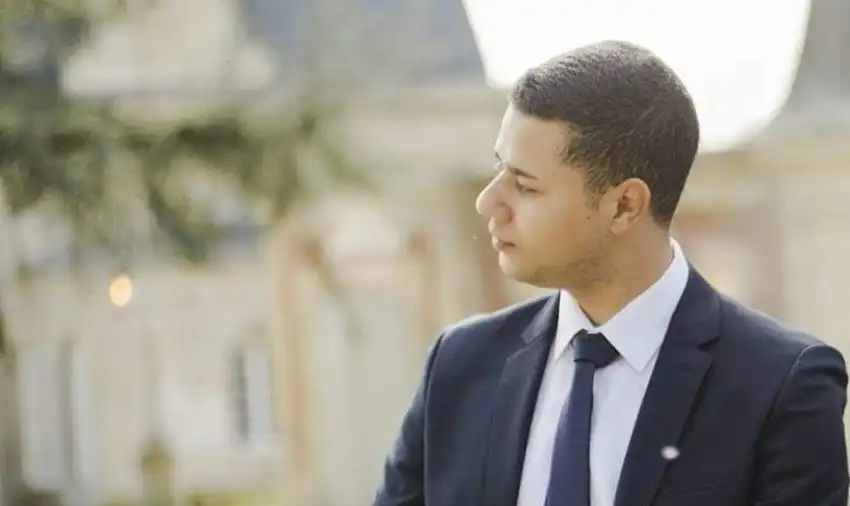Home>Meet a Graduate: "Imagining the city of tomorrow"
17.02.2023
Meet a Graduate: "Imagining the city of tomorrow"
Meet Souhail El Fatih who graduated in 2020 from the Master of Regional and Urban Strategy of Sciences Po Urban School after marking the smart decision to resume his studies.
What was your background before doing your Master?
My background is distinctive in that I’ve had a wide range of experiences. Fascinated by urban issues, I felt the need early on to get a broad view of the urban sector, to develop my understanding of the issues related to urban design and the public and private actors involved.
My initial six years of training at the National School of Architecture in Rabat (Morocco) developed my technical knowledge and gave me the first key concepts for approaching urban issues. My first work experience was in the Building Consultancy department at CBRE, a corporate real estate and investment firm, where I was involved in forecast studies.
I then joined the international urban planning agency Reichen & Robert et Associés, to learn about a form of urban planning practice based on “linkages between scales”, from architecture to the issues of “city-regions”, and which integrates the logics of new urban mobilities, energy efficiency and rational resource management. I worked on some large urban development projects: Casa Anfa (475 ha), which consists in transforming the site of the city's former airport into a city of 100,000 inhabitants and 100,000 jobs, and the new city of Zenata (1,670 ha), an eco-city project that puts people and innovation at the heart of its approach.
This experience, which lasted two years, helped me redefine my priorities for development, and made me want to complete my studies with a multidisciplinary programme applied to urban and regional issues. That’s why I decided to enrol in the Master of Regional and Urban Strategy. Of course, returning to study after a professional experience is not an easy decision to make but, supported and backed up in my choice by my colleagues and superiors, and above all convinced of the value of such training for my personal and professional development, I resumed my studies in 2018.
What is your current job?
After my Master’s degree, I returned to Carta-Reichen & Robert et Associés as a project manager. Reichen & Robert et Associés has built up extensive experience in the supervision and implementation of many complex urban planning and architecture projects. These projects involve reflection both on changing the use of existing buildings and on integrating new buildings into occupied sites, where the notions of environmental quality and sustainable development are recurrent.
I work on the design of architecture and urban development projects. I’m involved in all levels of the project from design to handover, including responding to calls for tender and site supervision. I also participate in forecasting and research, including studies on urban renewal, urban regeneration and urban development.
What do you like most about your job?
Architecture and urban planning is a fascinating profession. By definition, it entails working on living environments. The thinking that goes into a project must first of all take account of the architectural or urban heritage of the area concerned, and anticipate future issues in the light of current knowledge. It’s a perilous exercise that involves imagining the city of tomorrow and how to live in it. You have to consider new forms of housing and leisure, new ways of getting around and working.
It's a job that involves having a clear vision, knowing how to translate it into a project, and having the passion to share it. I also like the cross-cutting aspect of the job and the fact that it calls on a whole range of concepts borrowed from disciplines as diverse as sociology, economics, history, and so on.
I am also fortunate to be able to collaborate daily with a team of practitioners and experts who work together to bring about the transformation of our cities.
What did you gain from your education at Sciences Po?
In the Regional and Urban Strategy programme, I got to learn the fundamentals of local governance on various scales, and the way in which the different public and private actors work together to meet the challenges facing cities and regions. The team project I worked on (Production of the Urban Masterplan for the Sciences Po 2022 Campus) was particularly formative and rewarding. It gave me the opportunity to work in a team on a complex urban issue. I got to test a working approach that was completely new to me, combining analytical skills, looking at the big picture and critical thinking.
In addition to its recognised academic excellence, a Sciences Po education is a particularly enriching human experience that fosters the sharing of ideas, interdisciplinarity and collective intelligence.
What did you think of your second year as an apprentice?
Apprenticeship training is undoubtedly the best way to clarify your career plan. It’s an opportunity to leave your comfort zone and move towards new professional horizons. For my part, I chose to do my apprenticeship at TRANS-FAIRE, an engineering firm specialising in environmental quality. The experience gave me a better grasp of the issues involved in sustainable development and their impact on architectural and urban design. Thanks to that experience, I am now able to take a cross-sectional view of urban planning with a particular awareness of environmental issues.
MORE INFORMATION:


